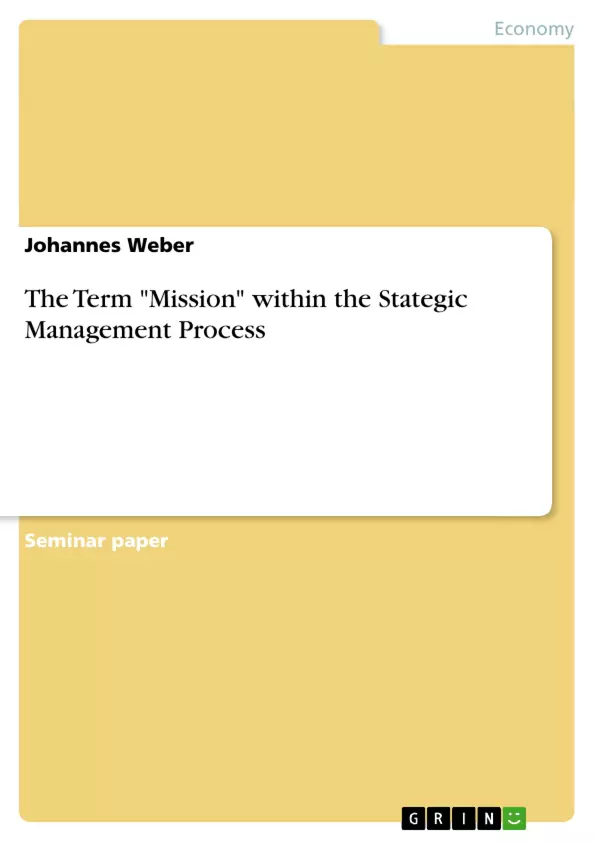Influenced by a growing number of acting companies, the world of nowadays business gets more and more integrated and enlaced with an increasing level of both national and global competition. Hence, gaining advantage over main rivals within a certain industry gets more important and makes many managers of modern-day companies thinking about ways to achieve this benefit. Whereas a lot of management members tend to focus on obvious solutions like cost reduction or promotional activities for instance, there are only a few so far who concentrate also on their firm’s mission as primary key to success. Mission, described as the “fundamental, unique purpose that sets” a certain organisation “apart from other firms of its type and that identifies the scope of its operations in products and in market terms” (Pearce, 1981), can act as an effective tool to achieve success if it is used and structured correctly. According to Campbell, however, managing this important purpose “is still a relatively uncharted area of management” and a lot of managers seem to not understand the “nature and importance of mission while others fail to consider it at all” (Campbell and Yeung, 2002, 284). Even if there are different opinions about the meaning of mission, many authors of management textbooks are of the same opinion that companies should include statements of their raison d’etre, their reason of existence, in the corporate planning process. This process, seen as “an identifiable flow of information through interrelated stages of analysis directed towards the achievement of an objective” (Pearce, 1981) is a dynamic system as companies often face incessant environment changes. Especially since budget-orientated planning mechanisms or forecast-based methods are seen to be insufficient to ascertain long-term survival and prosperity of corporations, it is vital that they conduct efficient strategic planning (Bradford et al., 2004). Regarding the process and the position of mission within it, you find several authors who advocate the position right at the beginning of Strategic Management whereas there are also theorists who see mission as a subsequent part or even as an output of it. This subject matter will be discussed in the next chapter followed by the topic of the role played by missions within the planning process of organisations. [...]
Inhaltsverzeichnis (Table of Contents)
- Preface: The importance of missions for modern-day companies.
- The position of a firm's mission within the Strategic Management process
- Mission as first step of the process.
- Mission as subsequent part or even outcome of the process.
- The role played by mission
- Basic potential roles of a mission.
Zielsetzung und Themenschwerpunkte (Objectives and Key Themes)
This paper explores the concept of "mission" within the strategic management process, examining its importance and position in modern-day companies. It aims to analyze the different perspectives on how mission fits into strategic planning and highlight the potential roles it plays in achieving organizational success.
- The significance of mission statements for companies operating in a competitive global market.
- The debate surrounding the placement of mission within the strategic management process, with some arguing for its initial placement and others advocating for its later integration.
- The diverse roles mission can play in organizational development and strategic planning, including guiding decision-making, setting objectives, and shaping corporate culture.
- The need for a comprehensive understanding of mission and its effective application in strategic planning to achieve long-term sustainability and prosperity.
- The exploration of diverse perspectives on mission and its impact on organizational performance.
Zusammenfassung der Kapitel (Chapter Summaries)
The first chapter, "Preface: The importance of missions for modern-day companies," sets the stage by highlighting the growing importance of a clear mission statement in today's competitive business environment. It emphasizes that a well-defined mission can provide a strategic advantage for companies, particularly in the face of increasing national and global competition.
The second chapter, "The position of a firm's mission within the Strategic Management process," examines the debate regarding the appropriate placement of mission within strategic planning. Some authors advocate for defining mission at the outset of the strategic management process, while others suggest it can be developed later on or even emerge as an outcome of the planning process. This chapter explores both perspectives and provides insights into their implications for strategic decision-making.
Schlüsselwörter (Keywords)
This paper focuses on the concept of mission, strategic management, corporate planning, organizational success, competitive advantage, global market, mission statement, and its application in the modern business context. It explores various perspectives on mission's placement and role within strategic planning, analyzing the potential benefits and challenges of incorporating mission into a company's strategic decision-making process.
Frequently Asked Questions
What is the definition of a company's "mission" in this paper?
A mission is described as the fundamental, unique purpose that sets an organization apart from others, identifying the scope of its operations in terms of products and markets.
Where should a mission statement be placed in the strategic management process?
There is a debate among theorists; some advocate for its placement at the very beginning of strategic management, while others see it as a subsequent part or even an output of the process.
Why is a mission statement important in today's business world?
In a global market with high competition, a well-defined mission acts as a primary key to success and provides a strategic advantage over rivals.
What roles can a mission statement play within an organization?
A mission can guide decision-making, help set organizational objectives, shape corporate culture, and ensure long-term prosperity.
Is strategic planning necessary for long-term survival?
Yes, because traditional forecast-based or budget-oriented methods are often insufficient to handle incessant environmental changes in the modern business context.
What are the common failures of managers regarding the firm's mission?
Many managers fail to understand the nature and importance of a mission or ignore it entirely, focusing only on obvious solutions like cost reduction.
- Quote paper
- Johannes Weber (Author), 2005, The Term "Mission" within the Stategic Management Process, Munich, GRIN Verlag, https://www.grin.com/document/69928



